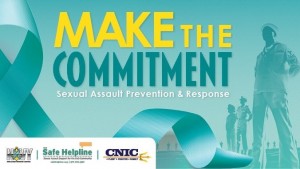- City and Installation Guide
- Installation Listings
- DOMESTIC VIOLENCE (DV)/SEXUAL ASSAULT PREVENTION & RESPONSE (SAPR) EXECUTIVE LEADERSHIP TRAINING
DOMESTIC VIOLENCE (DV)/SEXUAL ASSAULT PREVENTION & RESPONSE (SAPR) EXECUTIVE LEADERSHIP TRAINING
Installation Listings
Geographical Address
Contact Info
WHAT IS DOMESTIC VIOLENCE?
Domestic violence is a pattern of abusive behavior in any relationship that is used by one partner to gain or maintain power and control over another intimate partner. Domestic violence can be physical, sexual, emotional, economic, or psychological. This includes any behaviors that intimidate, manipulate, humiliate, isolate, frighten, terrorize, coerce, threaten, blame, hurt, injure, or wound someone.
Domestic violence can happen to anyone regardless of race, age, sexual orientation, religion, or gender. Domestic violence affects people of all socioeconomic backgrounds and education levels. Domestic violence occurs in both opposite-sex and same-sex relationships and can happen to intimate partners who are married, living together, or dating.
PHYSICAL ABUSE
Hitting, slapping, shoving, grabbing, pinching, biting, and hair pulling are types of physical abuse. Physical abuse also includes denying a partner medical care or forcing alcohol and/or drug use upon him or her.
You may be in a physically abusive relationship if your partner has ever...
- Damaged property when angry (thrown objects, punched walls, kicked doors, etc.).
- Pushed, slapped, bitten, kicked or choked you.
- Abandoned you in a dangerous or unfamiliar place.
- Scared you by driving recklessly.
- Used a weapon to threaten or hurt you.
- Forced you to leave your home.
- Trapped you in your home or kept you from leaving.
- Prevented you from calling the police or seeking medical attention.
- Hurt your children.
- Used physical force in sexual situations.
SEXUAL ABUSE
Coercing or attempting to coerce any sexual contact or behavior without consent is sexual abuse. Sexual abuse includes, but is certainly not limited to, marital rape, attacks on sexual parts of the body, forcing sex after physical violence has occurred, or treating one in a sexually demeaning manner.
EMOTIONAL ABUSE
Undermining an individual's sense of self-worth and/or self-esteem is abusive. This may include, but is not limited to constant criticism, diminishing one's abilities, name-calling, or damaging one's relationship with his or her children.
You may be in an emotionally abusive relationship if your partner...
- Calls you names, insults you or continually criticizes you.
- Does not trust you and acts jealous or possessive.
- Tries to isolate you from family or friends.
- Monitors where you go, who you call, and who you spend time with.
- Controls finances or refuses to share money.
- Punishes you by withholding affection.
- Threatens to hurt you, the children, your family or your pets.
ECONOMIC ABUSE
Making or attempting to make an individual financially dependent by maintaining total control over financial resources, withholding one's access to money, or forbidding one's attendance at school or employment.
PSYCHOLOGICAL ABUSE
Causing fear by intimidation; threatening physical harm to self, partner, children, or partner's family or friends; destruction of pets and property; and forcing isolation from family, friends, or school and/or work are all examples of psychological abuse.
Domestic violence not only affects those who are abused, but also has a substantial effect on family members, friends, co-workers, other witnesses, and the community at large. Children who grow up witnessing domestic violence are among those seriously affected by this crime. Frequent exposure to violence in the home not only predisposes children to numerous social and physical problems, but also teaches them that violence is a normal way of life, therefore, increasing their risk of becoming society's next generation of victims and abusers.
Map
-
{{#owner}}
-
{{#url}}
{{#avatarSrc}}
{{/avatarSrc}} {{^avatarSrc}} {{& avatar}} {{/avatarSrc}} {{name}} {{/url}} {{^url}} {{#avatar}} {{& avatar}} {{/avatar}} {{name}} {{/url}}
- {{/owner}} {{#created}}
- {{created}} {{/created}}


